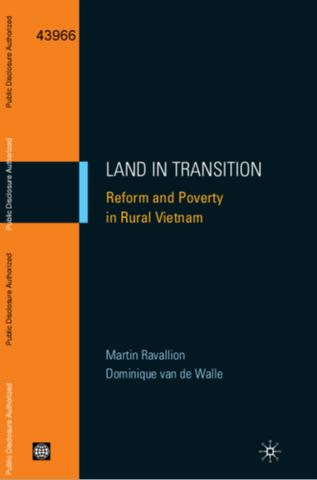The World Bank is a vital source of financial and technical assistance to developing countries around the world. We are not a bank in the ordinary sense but a unique partnership to reduce poverty and support development. The World Bank Group has two ambitious goals: End extreme poverty within a generation and boost shared prosperity.
- To end extreme poverty, the Bank's goal is to decrease the percentage of people living on less than $1.25 a day to no more than 3% by 2030.
- To promote shared prosperity, the goal is to promote income growth of the bottom 40% of the population in each country.
The World Bank Group comprises five institutions managed by their member countries.
The World Bank Group and Land: Working to protect the rights of existing land users and to help secure benefits for smallholder farmers
The World Bank (IBRD and IDA) interacts primarily with governments to increase agricultural productivity, strengthen land tenure policies and improve land governance. More than 90% of the World Bank’s agriculture portfolio focuses on the productivity and access to markets by small holder farmers. Ten percent of our projects focus on the governance of land tenure.
Similarly, investments by the International Finance Corporation (IFC), the World Bank Group’s private sector arm, including those in larger scale enterprises, overwhelmingly support smallholder farmers through improved access to finance, inputs and markets, and as direct suppliers. IFC invests in environmentally and socially sustainable private enterprises in all parts of the value chain (inputs such as irrigation and fertilizers, primary production, processing, transport and storage, traders, and risk management facilities including weather/crop insurance, warehouse financing, etc
For more information, visit the World Bank Group and land and food security (https://www.worldbank.org/en/topic/agriculture/brief/land-and-food-security1
Resources
Displaying 3996 - 4000 of 4906The Extent of the Market and Stages of Agricultural Specialization
This paper provides empirical evidence
of nonlinearity in the relationship between crop
specialization in a village economy and the extent of the
market (size of the urban market) relevant for the village.
The results suggest that the portfolio of crops in a village
economy becomes more diversified initially as the extent of
the market increases. However, after the market size reaches
a threshold, the production structure becomes specialized
The Environment for Women's Entrepreneurship in the Middle East and North Africa
This report is about how women
entrepreneurs can contribute more to the quality and
direction of economic and social development in the Middle
East and North Africa (MENA) region. Economic growth in the
Middle East has been remarkable since 2004, mainly because
of higher oil prices. Rapid job growth has followed, driven
mainly by the private sector. Yet the region still faces two
important challenges: the first is to create better jobs for
Services Trade and Growth
The competitiveness of firms in open
economies is increasingly determined by access to low-cost
and high-quality producer services - telecommunications,
transport and distribution services, financial
intermediation, etc. This paper discusses the role of
services in economic growth, focusing in particular on
channels through which openness to trade in services may
increase productivity at the level of the economy as a
Land in Transition : Reform and Poverty in Rural Vietnam
The policy reforms called for in the
transition from a socialist command economy to a developing
market economy bring both opportunities and risks to a
country's citizens. In poor economies, the initial
focus of reform efforts is naturally the rural sector, which
is where one finds the bulk of the population and almost all
the poor. Economic development will typically entail moving
many rural households out of farming into more remunerative
Land in Transition : Reform and Poverty in Rural Vietnam
The policy reforms called for in the
transition from a socialist command economy to a developing
market economy bring both opportunities and risks to a
country's citizens. In poor economies, the initial
focus of reform efforts is naturally the rural sector, which
is where one finds the bulk of the population and almost all
the poor. Economic development will typically entail moving
many rural households out of farming into more remunerative







